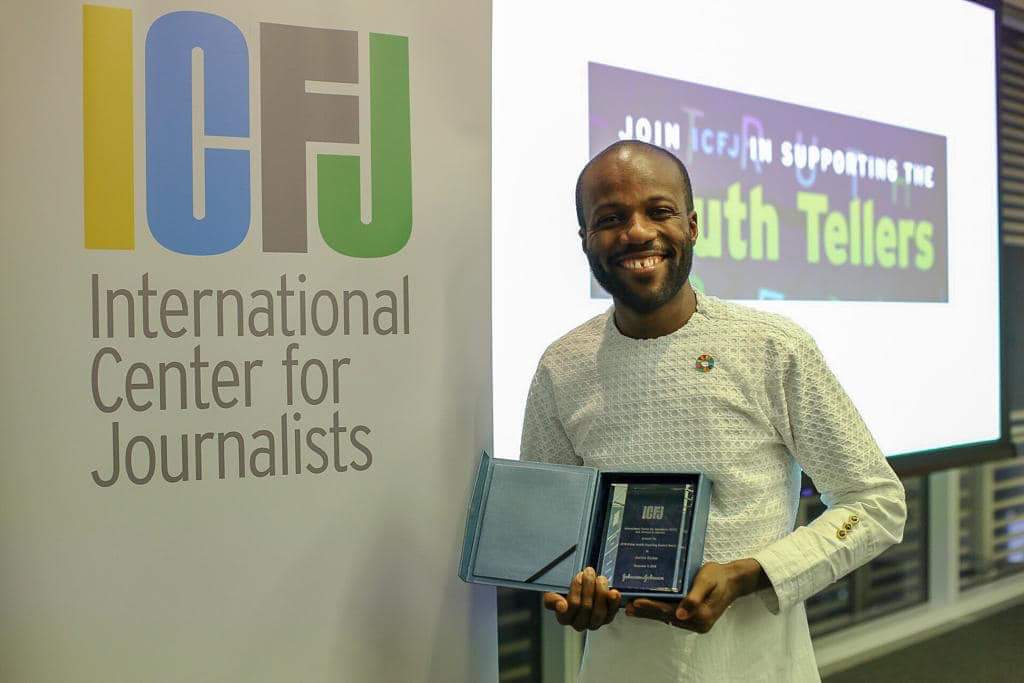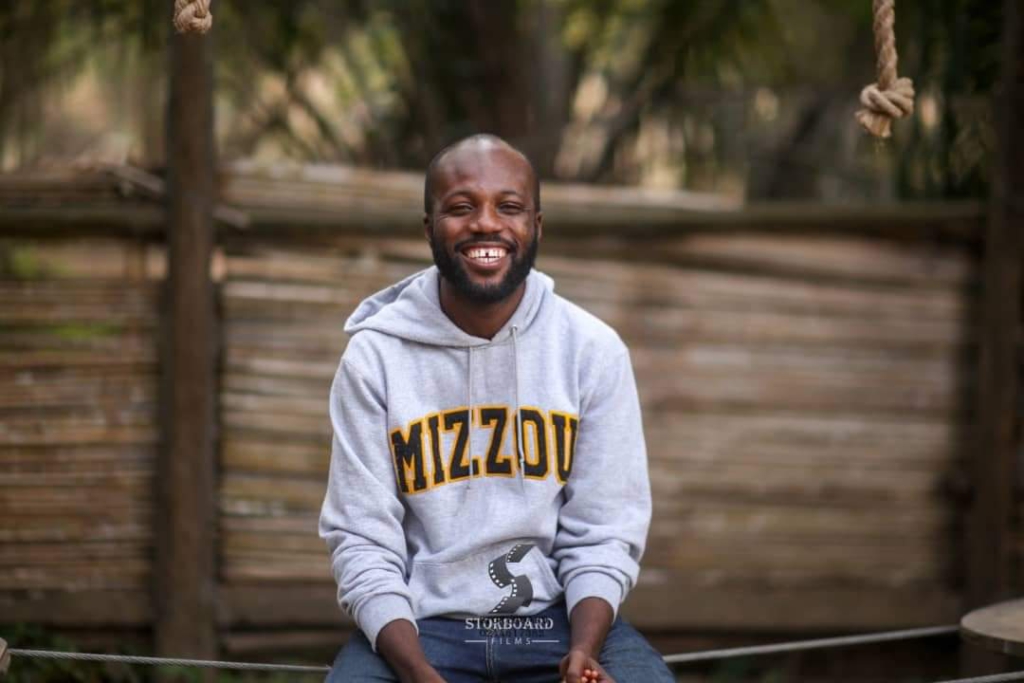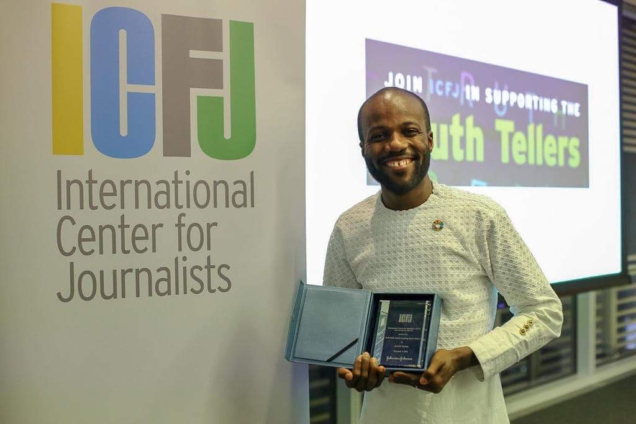Last year, Justice Baidoo, a journalist, documentary filmmaker and a media consultant was the first Ghanaian to win a Food Security Fellowship funded by the Alfred Friendly Press Partners which granted him a month academic training at the Missouri University School of Journalism and a five-month internship at the Los Angeles Times, America’s fourth largest newspaper.
His second award for the year, the Cocoa Reporting Journalist of the year at the maiden Ghana Cocoa Awards, recognised his work reporting on the black pod disease which affects cocoa, one of Ghana’s major exports and another story on the plights faced by cocoa farmers.
He swept up a third award that year, the Telecoms Reporting award, in the annual Ghana Journalists Association Awards.
Two years ago, Justice made history as one of the six winners of the International Center for Journalism’s Global Health Reporting Award. The submission the esteemed panellists chose for the award was titled “Shortage of Plumpy Nut” in which Justice tells the harrowing story of how a lack of food supplement for malnourished children in the Northern
Region was effectively condemning many of these children to death. The heart-breaking images of visibly distressed and emaciated babies and the sounds of their desperate cries started a “huge national conversation within minutes of airing”.

A day after the story aired, the United Nations International Children’s Emergency Fund airlifted 4,000 boxes of Plumpy Nut to areas most affected by the shortage and pledged to continue the supplies. Even though the award which earned him $ 1,000 and a tour of America’s largest media houses like the New York Times and the Washington Post was well deserved, the impact the story made on the lives of these malnourished children is a compelling statement on how a well-trained individual can change the world.
In 2017, a story he did on how bad roads connecting farms to markets is disrupting the food security of the nation, won the Food Sustainability Media Award organized by the Thomson Reuters Foundation and the Barilla Center. That same year he won a fellowship to attend the Global Climate Reporting Program awarded by the International Center for Journalists for his role in climate change reporting.
That same year, a documentary on the myths surrounding the use of contraceptives in parts of Ghana aired on Joy News, a subsidiary of Multimedia Group Limited the nation’s largest media house where Justice works as a senior journalist, won the TV story of the year at the 2018 African Journalists Family Planning Reporting Awards organised by the International Planned Parenthood Federation- Africa Region.
In 2017, a story he did on how bad roads connecting farms to markets is disrupting the food security of the nation, won the Food Sustainability Media Award organized by the Thomson Reuters Foundation and the Barilla Center. That same year he won a fellowship to attend the Global Climate Reporting Program awarded by the International Center for Journalists for his role in climate change reporting.
In 2013, his piece on the role of blacksmiths in improving peace and security in northern Ghana was judged one of top 3 success stories for the UN agency’s work in Africa.

These successes would have come as a surprise to a younger Justice whose ambition while in basic school was to be a pilot. An ambition partly fuelled by his love of travelling and his strong performance in science subjects. However, he had to defer the dream after later discovering his relative weakness in mathematics.
In Junior High School, he joined a youth group who organised a radio show called “Curious Minds” at the Takoradi based Twin City Radio. For two years, the show featured Justice and his colleagues advocating for the importance of the Millennium Development Goals and how these goals impacted the average citizen. He recalls that it was this show which unearthed in him a desire to be a journalist.
These successes would have come as a surprise to a younger Justice whose ambition while in basic school was to be a pilot. An ambition partly fuelled by his love of travelling and his strong performance in science subjects. However, he had to defer the dream after later discovering his relative weakness in mathematics.
A desire which was further cemented when he won the first runner up place in a talent show to discover young potential journalists organised by Melody FM.
He said, “It allowed me to talk about issues affecting people in my neighbourhood and when I came back home people will congratulate me for raising these issues. So I realised then what impact journalism can make.”
Just after completing junior high school and gaining admission to the prestigious Ghana Secondary Technical School, his father lost his job which dealt a blow to the family’s finances. His parents could no longer afford to send him there so they had to find him admission at Baidoo Bonsoe Secondary Technical where he read General Arts. Feeling derailed, he struggled to focus on his classes which reflected in his poor results when he sat for his WASSCE in 2005.
The results ended up being a wake-up call for him to get his life on track. He worked as a pupil-teacher from 2005 to 2008 and was among the first group of people to be recruited into the newly created National Youth employment Programme. Distracted by the pace of life in Takoradi, Justice specifically requested to be posted to a remote area so he could get a quiet space to reset his life and education plan.
He was posted to a small village called Akwaeda about an hour’s drive from Cape Three Points. Despite having to cope with the general lack of amenities he described his stay there as successful partly because he was able to turn his life around and also because he was able to save money.
In 2008, he sat for and passed a remedial WASSCE which enabled him to apply and secure a place at the Ghana Institute of Journalism. In 2010, he did a one-year internship at Joy FM, following that up with a six-month internship at Daily Graphic in 2011.
Graduating from GIJ in 2012, he did his National Service at Daily Graphic as a reporter where his hard work earned him front-page stories and published long-form features.
This brought him to the attention of an official at the UNDP who offered him a recently vacated Communications Officer role. He cut short his National Service at Daily Graphic and completed the remaining six months there. In terms of career moves, it was a risky decision because at Daily Graphic his high performance had made the offer of a permanent job a forgone reality while his future after National Service was uncertain at UNDP.
He recalls that he was in tears when two months after he left, Daily Graphic advertised vacancies which ended up going to his colleagues. He, however, made the most out of his stay at UNDP, gathering experience and contacts which would come to serve him well in his later career journey. November
2013 found him at Metro TV in an internship role and where for the first time he was exposed to television production.
With that experience under his belt, in 2014, he applied for and gained a television reporter role at Multimedia Group Limited. After six months in his new role, he won a Tullow Group Scholarship on his third try, to pursue an MA in International Journalism at Cardiff University. He described his year at Cardiff this way, “I am who I am today because of that year.
It was life-changing."
My life was enriched in all areas from career to education. Personally, I was more invested in the practice of journalism than the academic side, so I hunted for internships and actively followed British media and their content development. I learnt a lot from my internship role at the campus radio “Xpress Radio” and a role at Sky Television”.

He returned to the country in 2015 and because The Multimedia Group was expanding into television and documentary production he was promoted to be a senior journalist due to his skill in documentary filmmaking, an area of specialisation in his Masters. His ten years of journalism, mostly dealing with topics on national development, climate change, food security
and health has been described as analytical, in-depth and effective and his many awards on the national, continental, and global stages testifies to this fact.
Asked what his biggest challenge in his daily work is, he replied that “Even though Ghana is a developing country, I believe we should tell stories to stand up to international best practices. We should be able to have the resources, funding, space and time to be able to do stories without compromising on quality.”
Justice is happily married and has two sons.
Latest Stories
-
Automobile artisans urge gov’t to support establishment of workshop facilities
20 minutes -
Gov’t to revamp, takeover AirtelTigo – Communications Minister
31 minutes -
Mahama recounts childhood ties with Asantehene: “They used to send us for ice cream”
44 minutes -
Emmanuel Adjei cycles 10,000km solo from Munich to Accra to raise €100,000 to support education in rural communities
53 minutes -
From bite to breakthrough: How AI and brave family helped save a child at KATH
58 minutes -
Today’s Front pages: Tuesday, June 3, 2025
1 hour -
Cedi appreciation a strategic windfall for energy sector recovery and ECG’s solvency
2 hours -
GSE rally to continue into quarter 3; market to record 45% return for investors in 2025
2 hours -
Bond market: Trading activity rose 28% to GH¢1.41bn
2 hours -
We’ll be waiting for you to bring Ofori-Atta back – Frank Davies calls OSP’s bluff
2 hours -
You stepped forward to assist your nation – Mahama backs Otumfuo’s mediation in Bawku crisis
2 hours -
‘We thought that was abuse of state power’ – Alhassan Tampuli rebukes EOCO over Wontumi detention
2 hours -
Gov’t moves to ensure inclusive access to free tertiary education for Persons with Disabilities
3 hours -
Mobile data prices to fall, users to get more value – Sam George
3 hours -
Alhassan Tampuli urges OSP to grant Ofori-Atta’s request for virtual appearance
3 hours

